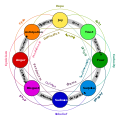This article is missing information about the philosophical and religious aspects of kindness.(May 2025) |
| Part of a series on |
| Emotions |
|---|
  |

Kindness is a type of behavior marked by acts of generosity, consideration, or concern for others, without expecting praise or reward in return. It is a subject of interest in philosophy, religion, and psychology.
Contents
- History
- In society
- In psychology
- Teaching kindness
- See also
- References
- Further reading
- External links
It can be directed towards one's self or other people, and is present across multiple different species and cultures.


